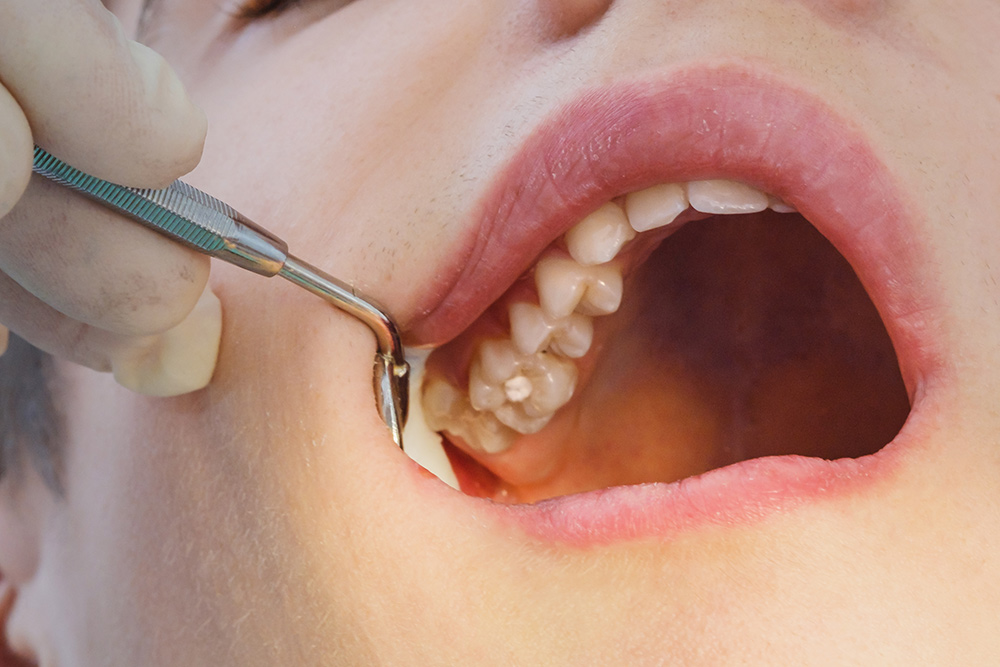Yes, baby teeth need fillings. Baby teeth are just as prone to cavities and decay as adult teeth, so they can benefit from dental fillings to protect them from further damage. Fillings help prevent bacteria growth and reduce pain caused by infection or decay.
If a cavity is left untreated it can cause the tooth root to become infected and even lead to abscesses or other infections which may require more extensive treatment than a simple filling. For these reasons, it’s important that any cavities in baby teeth be filled in order to ensure the best oral health for your child into adulthood.
Baby teeth may not be permanent, but they still need to be taken care of! Baby teeth are essential for proper speech and chewing habits, so it’s important that they stay healthy. Cavities can form in baby teeth just like adult teeth, so if you think your child has a cavity, it’s important to take them to the dentist as soon as possible.
While some cavities don’t require fillings right away, others might need one in order to protect their tooth from further damage. It is always best to consult with your dentist about the best treatment plan for your child’s oral health needs.
Alternatives to Filling Cavities in Baby Teeth
One alternative to filling cavities in baby teeth is called “watchful waiting”. This means that the dentist will monitor the tooth closely and provide preventive treatment if necessary, but no immediate action is taken. The main advantage of this approach is that it does not involve any invasive procedures, which can be beneficial for young children who may find going to the dentist a stressful experience.
Additionally, since primary (baby) teeth eventually fall out, some dentists feel that filling them may not be necessary as they will eventually be replaced by adult teeth.

What Happens If You Don’t Fill Cavities in Baby Teeth?
If you don’t fill cavities in baby teeth, it can lead to a number of dental health issues. Cavities are caused by bacteria that feed on sugary foods and drinks, which produce an acid that eats away at the enamel of your child’s teeth. Without treatment, these cavities will continue to grow until they reach the pulp of the tooth – leading to pain and infection.
In addition, when left untreated for too long, cavities can cause damage to adult teeth as they erupt from underneath the baby tooth. This means more costly treatments like root canals or crowns may be necessary down the road if cavities aren’t filled in time. Furthermore, having multiple cavities in baby teeth increases your child’s risk of developing gum disease later on due to plaque buildup around those areas where decay is present.
Finally, when baby teeth become severely damaged due to decay, it can affect your child’s ability to eat properly and speak clearly while their permanent teeth are still coming in – so it’s important not just for aesthetics but also for nutrition/developmental purposes that you get this taken care of as soon as possible!
How Common are Cavities in Baby Teeth?
Cavities in baby teeth are surprisingly common! Although they often get overshadowed by the excitement of a child’s first tooth, it is important to understand that cavities can occur at any age. According to the American Academy of Pediatric Dentistry, 42% of children aged 2-11 have had at least one cavity or filling.
While this number drops slightly as children reach adolescence (33%), it is still far higher than many people realize. The good news is that cavities in baby teeth can be prevented and treated with relative ease if caught early enough. Regular brushing and flossing should begin from the time your child has their first tooth, and regular visits to the dentist will help catch any potential problems before they worsen.
Eating healthy foods low in sugar and starchy carbohydrates also helps limit decay caused by bacteria that feeds on these substances. Taking these simple steps can help prevent your child from experiencing pain associated with cavities and better prepare them for when their adult teeth come in strong and healthy!
Should a 5-Year-Old Get Cavities Filled?
When it comes to the question of whether or not a 5-year-old should get cavities filled, the answer is not so straightforward. On one hand, many parents feel that their child may be too young for this type of procedure; however, on the other hand, leaving cavities untreated can lead to more serious dental issues in later years. Ultimately, it will depend on each individual case and what’s best for your child.
In general, though, dentists agree that if your child has even small amounts of decay in baby teeth – especially molars – then they should get them filled as soon as possible (before age 6) since those teeth serve an important role in helping guide permanent adult teeth into place when they come in around age 6 or 7. Additionally, having cavities treated at an earlier age can help limit pain and discomfort from further decay over time. Furthermore, some studies have indicated that by filling cavities early you may help prevent future problems with anxiety surrounding dental visits later down the road.
However, ultimately it’s up to you as a parent to decide what’s best for your own 5-year-old based on advice from your dentist and taking into account any special needs or circumstances unique to your family situation.
Is It Necessary to Fill Cavities in Baby Teeth?
Yes, it is necessary to fill cavities in baby teeth. Baby teeth are just as important as adult teeth and can be susceptible to decay even at a young age. Filling the cavity helps protect the tooth from damage caused by decay and also keeps surrounding teeth healthy.
Additionally, untreated cavities can cause pain and discomfort for your child which may lead to difficulty eating or talking. Without treatment, bacteria from the infection could spread into other areas of the mouth causing further damage such as gum disease or an abscessed tooth. By filling the cavity early on you not only help prevent future issues but you also ensure that your child’s smile stays healthy now and in years to come!
Do children need filling of milk teeth? – Dr. Maneesh Chandra Sharma
Conclusion
This blog post has shown that baby teeth can, in fact, require fillings. It is important to understand the importance of taking care of your child’s teeth by brushing and flossing regularly and visiting the dentist for regular check-ups. Baby teeth are important for chewing food properly, speaking correctly, and maintaining a healthy smile until permanent adult teeth come in.
Proper dental hygiene from an early age helps prevent cavities and other tooth decay-related issues which may lead to needing fillings or other more invasive treatments later on down the road. Taking care of a baby’s teeth now will help ensure their oral health later in life!





